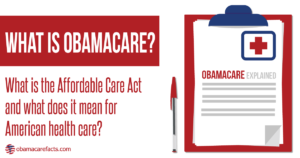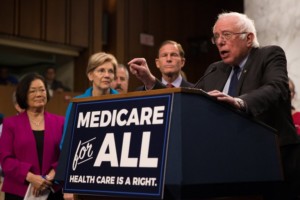November 2, 2016 2:20 PM ET
NPR-Heard on All Things Considered
Alison Kodjak
When it comes to health care, the choice between Hillary Clinton and Donald Trump comes down to whether to keep, or trash, the Affordable Care Act.
Premium Hike Catapults Obamacare Into Election Spotlight
Trump says he wants to repeal and replace the health care law that is responsible for insuring about 20 million people, while Clinton has vowed to retain it and even expand its reach.
Here are the candidates’ plans:
HILLARY CLINTON
Keep and build on Obamacare
Offer a tax credit of up to $5,000 to offset out-of-pocket costs over 5 percent of income
Create a “public option” for health insurance
Increase funding for community health centers
Establish federal oversight of drug price increases
Allow people to “buy in” to Medicare starting at age 55
Clinton’s plan maintains the basic structure of Obamacare, with its expansion of Medicaid to more people with higher incomes and the ability to buy insurance through government-run exchanges. But she acknowledges problems with the program in its current form and offers changes to cut consumer costs, rein in drug prices, and ensure more uninsured people get covered.
The so-called public option would allow consumers to buy health insurance directly from the federal government. It’s proposed in most cases to ensure there are choices for buyers in places where only one insurance company offers policies through the Obamacare exchanges.
Hillary Clinton Hitches Her Health Care Wagon To Obamacare
An analysis of Clinton’s plan by the Commonwealth Fund, a private foundation that supports independent health care research, concludes it would boost the number of people with health insurance by about 400,000. But the impact on the federal deficit is unclear: The report says it could range from a small decline to an increase of as much as $90 billion.
The Commonwealth analysis doesn’t account for Clinton’s proposal to allow people to “buy in” to Medicare at 55 rather than waiting until 65. That could reduce premiums for younger people who buy insurance through the ACA exchanges but would increase the cost of Medicare, says Joe Antos, a scholar at the American Enterprise Institute.
“She says ‘buy in’ because that disguises the fact that there has to be more taxpayer money in the subsidy to work,” Antos says.
If the House remains under Republican control, there’s little to no chance the public option or Medicare buy-in will become law.
DONALD TRUMP
Repeal and replace Obamacare
Promote tax-free health savings accounts
Make insurance premiums tax-deductible
Allow insurers to sell policies across state lines
Turn Medicaid into a state block grant program
Allow consumers to import drugs from other developed countries
Trump, like most Republicans, says he wants to repeal Obamacare, but he hasn’t offered many details about what will happen to the 20 million people who will lose their insurance if that happens. In a speech this week, his running mate, Mike Pence, said Obamacare subsidies would be phased out so consumers could have a smoother transition to new insurance.
To buy that insurance, Trump wants to expand the use of health savings accounts, which allow people to save money tax-free to pay for health care costs. He also says allowing insurance companies to sell policies across state lines will cut costs, a notion economists question.
How Gaps In Mental Health Care Play Out In Emergency Rooms
The Commonwealth Fund analysis says Trump’s proposal would increase the number of people without insurance by as many as 25 million.
As with Clinton’s plan, the estimates of this plan’s impact on the budget is a big range, from no impact to an increase of as much as $41 billion. That’s because much of his plan involves tax breaks to encourage people to buy insurance, while taking away the requirement to buy that’s embedded in the Affordable Care Act.
Questions about Obamacare and reimbursement? Physician Credentialing and Revalidation ? or other changes in Medicare, Commercial Insurance, and Medicaid billing, credentialing and payments? Call the Firm Services at 512-243-6844




